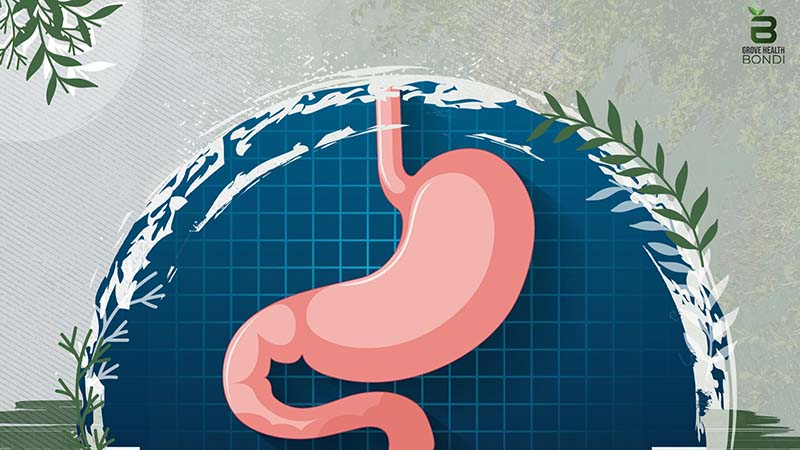Pineapple is a delicious fruit with a multitude of preparation methods. Its standout feature is its abundance of nourishing nutrients, which can support beauty enhancement for the skin and aid in effective weight loss. In this article, let’s join Grove Health Bondi in exploring the question of “how many calories in pineapple?” – a query that has garnered the interest of many. In addition to this, we will also delve deeper into the health benefits that pineapple provides for our bodies. This fruit’s multifaceted benefits make it a fascinating subject for those interested in health and wellness.

1. Caloric Content of Pineapple
According to data from the United States Department of Agriculture (USDA), every 165g of fresh pineapple contains approximately 82.5 calories. Specifically, this includes:
- Fat: 0.2g
- Sodium: 1.7mg
- Carbohydrates: 22g
- Fiber: 2.3g
- Sugar: 16.3g
- Protein: 0.9g
- Vitamin C: 79mg
Therefore, an average pineapple (about 500g) will contain about 250-300 calories, depending on the size and ripeness of the fruit.
Additionally, pineapple juice also contains calories but less than fresh pineapple. A 300ml glass of pineapple juice contains about 130 calories.
With its low calorie content and abundant fiber, pineapple is an excellent choice for those pursuing weight loss goals or maintaining their physique.

2. Nutritional Value of Pineapple
Not only does pineapple have a low calorie content, but it also contains a variety of vitamins and minerals essential for the body. Specifically, each pineapple contains:
- 0.2 grams of fat
- 2.3 grams of fiber
- 16.3 grams of sugar
- 22 grams of carbohydrates
- 1 gram of protein
- 1.7 mg of sodium
In addition, pineapple contains a large amount of vitamins A, C, E, and B6. Notably, pineapple also contains the compound Bromelain, which has the ability to reduce inflammation and prevent cancer.
With its rich mineral content, including manganese, calcium, iron, and zinc, pineapple helps provide energy for the body, counteracts oxidation processes, and promotes metabolism. This makes pineapple an excellent choice for those looking to maintain a healthy lifestyle.

3. Health Benefits of Pineapple
Pineapple is not just a delicious and sweet-smelling fruit, but it also harbors a plethora of astonishing health benefits. Let’s delve into how this fruit contributes to the improvement and maintenance of overall health:
- Enhancing Digestive Abilities: Pineapple contains bromelain – a special enzyme capable of breaking down protein chains, thereby supporting a less troublesome digestive process. Particularly, those suffering from pancreatic insufficiency will notice a significant difference when adding pineapple to their diet.
- Preventing Cardiovascular Diseases and Cancer: Pineapple is a treasure trove of antioxidants and anti-inflammatory substances like vitamin C, manganese, flavonoids, and phenolic acids. These compounds help combat the formation and development of cancer cells, as well as reduce the risk of cardiovascular diseases.
- Improving Bone and Joint Health: Research has shown that consuming foods rich in vitamin C can reduce the risk of bone and joint-related diseases by up to 34%. Hence, pineapple becomes an excellent choice to protect and nourish bone and joint health.
- Promoting Firm and Smooth Skin: The abundant amount of vitamin C in pineapple supports collagen synthesis, reducing the risk of skin damage due to sun exposure. The result is improved skin that becomes firm and effectively reduces wrinkles.
- Enhancing Memory: The bromelain enzyme in pineapple can break down molecules causing Alzheimer’s disease, thereby playing a positive role in protecting and enhancing memory.
- Reducing Stroke Risk: The rich potassium content in pineapple helps dilate blood vessels, allowing blood to circulate easily throughout the body, reducing the risk of blood clotting and effectively preventing strokes.

4. Does Eating Pineapple Lead to Weight Gain?
Pineapple is an excellent choice for those looking to control or lose weight. This fruit contains very little fat and is a rich source of fiber and minerals, helping the body effectively regulate carbohydrate digestion, thereby supporting metabolism and preventing fat accumulation.
In addition, pineapple contains the enzyme bromelain, which plays a crucial role in breaking down protein and aiding in burning excess fat in the body. With water making up over 87% of its weight, pineapple helps you feel fuller for longer after eating, which greatly supports daily portion control. Therefore, pineapple not only does not cause weight gain but can also be a part of an effective weight loss diet.

5. 6 Remarkable Benefits of Pineapple for Weight Loss
Pineapple is a nutrient-rich fruit that can effectively support the weight loss process. Below are some benefits that pineapple provides for the body during weight loss:
5.1. Low in Calories and Carbs
Pineapple is an excellent choice for those following a weight loss diet. In 100g of pineapple, there are only 22g of carbohydrates, providing just 50 calories. Notably, out of these 22g of carbohydrates, up to 16g is fructose, a natural sugar.
Compared to commonly consumed fruits like bananas or watermelons, the glycemic index of pineapple is much lower. This helps the body control blood sugar levels more effectively, supporting a healthy and sustainable weight loss process.

5.2. Contains Enzymes that Break Down Protein and Belly Fat
Bromelain, an enzyme found in pineapple, plays a crucial role in breaking down proteins, aiding the body in smoothly digesting food. Importantly, Bromelain also helps us burn excess calories, contributing to belly fat reduction. For this reason, pineapple is often chosen by many as a part of their weight loss diet, along with regular physical exercise. This makes pineapple a popular choice for those looking to maintain a healthy lifestyle and achieve their fitness goals.

5.3. High in Dietary Fiber
Pineapple contains both soluble and insoluble fiber, which helps create a feeling of fullness that lasts longer than many other foods. As a result, cravings are controlled, helping to limit the consumption of excess calories. This is very beneficial for weight control and maintaining a healthy lifestyle. This makes pineapple a popular choice for those looking to maintain a balanced diet and achieve their fitness goals.
5.4. Beneficial for Digestive Health
Bromelain, a key component in pineapples, aids in protein digestion, thereby enhancing the body’s nutrient absorption capabilities. Moreover, pineapples, being rich in dietary fiber, stimulate the metabolism of food within the digestive system. This helps in reducing undesirable symptoms like constipation and bloating.

5.5. Helps Curb Appetite and Hydrates the Body
Pineapple, rich in antioxidants, provides a substantial amount of water and fiber to the body. This not only hydrates the body but also reduces hunger, aiding in portion control.
5.6. Rich in Manganese
Pineapple stands out among fruits for its rich content of manganese, a mineral that plays a crucial role in regulating the metabolism of fats and carbohydrates, effectively supporting weight loss processes. But that’s not all, manganese also contributes to the production of collagen – a protein that helps maintain skin elasticity and protects the body’s joint and bone system.

6. Effective Ways to Include Pineapple in a Weight Loss Diet
To leverage the amazing benefits of pineapple for weight loss, you can incorporate the following methods into your daily diet:
6.1. Enjoy Fresh Pineapple
This method is simple and time-saving. You can purchase pre-peeled pineapple or prepare it at home. Cut the pineapple into small pieces and store them in the refrigerator to keep them cool and delicious. Eating pineapple about 30 minutes after meals is better than when you’re hungry to avoid irritating the stomach.
6.2. Make Pineapple Juice
If you have a lot of pineapples, try juicing them into a tasty fresh juice. This is an ideal drink for hot summer days, not only quenching your thirst but also supporting weight loss. With just 30 seconds in a juicer, you can enjoy a delicious glass of juice. For extra coolness, you can refrigerate the juice or add ice.
6.3. Prepare Pineapple Salad
Another way to add pineapple to your diet is to combine it with other vegetables in a fresh salad. You can mix pineapple with cucumber, lettuce, tomatoes, avocado, oranges, and your favorite dressings. Salad not only enriches your meal but also helps you feel fuller longer, reducing cravings.
6.4. Incorporate Pineapple in Stews and Stir-fries
Pineapple is a versatile ingredient that can be combined with various dishes, from appetizers to main courses. Experiment with adding pineapple to meat or fish stews to create a unique flavor, while helping you control the calories intake. Some delicious dishes to try are pineapple glazed ribs or pineapple sour soup, both excellent choices for your weight loss menu.

7. Things to Keep in Mind When Consuming Pineapple
When incorporating pineapple into your diet, keep in mind the following important considerations to ensure your health:
- Limit Pineapple Consumption: Pineapple is highly nutritious, but it should not be consumed excessively. Overconsumption can lead to irritations such as rashes or a numb tongue. Nutritionists recommend eating a maximum of 2 pineapples per day to avoid these issues.
- Timing of Pineapple Consumption: Avoid eating pineapple on an empty stomach as the acid and bromelain enzyme in pineapple can cause inflammation of the stomach lining. The ideal time to enjoy pineapple is about 30-45 minutes after lunch or dinner.
- Who Should Avoid Pineapple: If you have open wounds, are suffering from dengue fever, or have nosebleeds, avoid pineapple as it can exacerbate your condition. Pregnant women or those who have just given birth should also exercise caution as pineapple can cause uterine contractions, increasing the risk of miscarriage or premature birth. People with allergic rhinitis or stomach pain should also limit pineapple to avoid ulcers.
- Interaction with Medication: If you are taking medication, consult your doctor before eating pineapple to avoid unwanted reactions.
- Listen to Your Body: If you feel uncomfortable, develop a rash, have difficulty breathing, or break out in hives after eating pineapple, seek immediate medical care as these could be signs of an allergic reaction.
8. Conclusion
We hope that the information on “how many calories in pineapple?” and the wonderful benefits this fruit offers have provided you with a clear understanding of the role of pineapple in maintaining health and physique. To explore more health knowledge and other useful and interesting articles, we invite you to follow us regularly.
>> See more related articles:
1. How Many Calories Are In An Apple? Answers From Experts
2. How Many Calories in an Egg? Gain or Lose Weight?
3. How Many Calories in a Banana? Classification and Comparison

